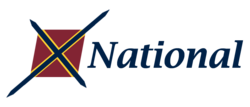National Party (Norden): Difference between revisions
(Created page with "{{Region icon Aurorum}} {{WIP}} {{Infobox political party |name = National Party |native_name = Nationalpartiet |logo = File:Norden_Nation...") |
No edit summary |
||
| Line 36: | Line 36: | ||
The '''National Party''' ({{wp|Danish language|Dalish}}: ''Nationalpartiet''), or simply '''National''', is a {{wp|centre-right}} {{wp|conservative}} political party in [[Norden]]. The party, led by Magnus Kjærsgaard since 2014 is currently the largest party within the [[Rigsdagen of Norden|Folkekammer]] and the current governing party of the nation. | The '''National Party''' ({{wp|Danish language|Dalish}}: ''Nationalpartiet''), or simply '''National''', is a {{wp|centre-right}} {{wp|conservative}} political party in [[Norden]]. The party, led by Magnus Kjærsgaard since 2014 is currently the largest party within the [[Rigsdagen of Norden|Folkekammer]] and the current governing party of the nation. | ||
Formed in 1920 by Ulrik Graversen, the National Party has historically dominated elections within Norden, having won a majority in all-but 5 elections since the implementation of {{wp|universal suffrage}} in 1918. Though traditionally a conservative party, the National party has traditionally encompassed a relatively wide range of views, particularly in regards to economic policy. In contrast with many other conservative parties throughout Aurorum, the National Party does not maintain a firm commitment to ''{{Wp|laissez-faire}}'' economics, instead advocating for elements of {{wp|economic interventionism}}, particularly in regards to {{wp|natural monopolies}}. | Formed in 1920 by Ulrik Graversen, the National Party has historically dominated elections within Norden, having won a majority in all-but 5 elections since the implementation of {{wp|universal suffrage}} in 1918. Though traditionally a conservative party, the National party has traditionally encompassed a relatively wide range of views, particularly in regards to economic policy. In contrast with many other conservative parties throughout Aurorum, the National Party does not maintain a firm commitment to ''{{Wp|laissez-faire}}'' economics, instead advocating for elements of {{wp|economic interventionism}}, particularly in regards to {{wp|natural monopolies}}. Nevertheless, in terms of social policy, the party is ardently {{wp|social conservative}}, opposing the legalisation of gay marriage and upholding the virtues of traditional institutions such as the Nordic Semitar Church. | ||
==History== | ==History== | ||
==Ideology== | ==Ideology== | ||
Revision as of 19:47, 20 October 2021
This article is incomplete because it is pending further input from participants, or it is a work-in-progress by one author. Please comment on this article's talk page to share your input, comments and questions. Note: To contribute to this article, you may need to seek help from the author(s) of this page. |
National Party Nationalpartiet | |
|---|---|
 | |
| Leader | Magnus Kjærsgaard |
| Speaker | Margret Sveinbergsdóttir |
| Chairman | Oskar Brandt |
| Founder | Ulrik Graversen |
| Founded | 1920 |
| Headquarters | National Party HQ, Nyhavn, Kristianshavn |
| Ideology | Conservatism One-nationism Big-tent |
| Political position | Centre-right |
| Colours | Blue |
| Folkekammer | 142 / 246
|
| Election symbol | |
| Nat | |
The National Party (Dalish: Nationalpartiet), or simply National, is a centre-right conservative political party in Norden. The party, led by Magnus Kjærsgaard since 2014 is currently the largest party within the Folkekammer and the current governing party of the nation.
Formed in 1920 by Ulrik Graversen, the National Party has historically dominated elections within Norden, having won a majority in all-but 5 elections since the implementation of universal suffrage in 1918. Though traditionally a conservative party, the National party has traditionally encompassed a relatively wide range of views, particularly in regards to economic policy. In contrast with many other conservative parties throughout Aurorum, the National Party does not maintain a firm commitment to laissez-faire economics, instead advocating for elements of economic interventionism, particularly in regards to natural monopolies. Nevertheless, in terms of social policy, the party is ardently social conservative, opposing the legalisation of gay marriage and upholding the virtues of traditional institutions such as the Nordic Semitar Church.